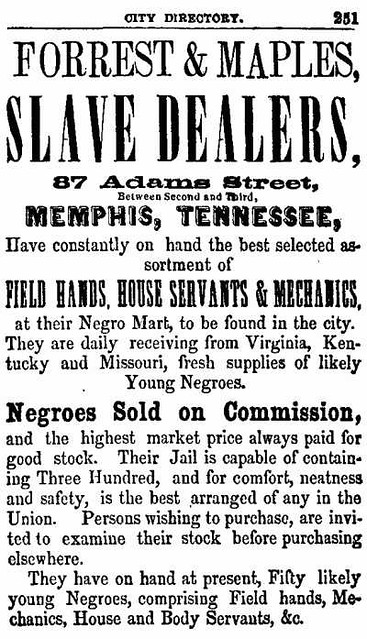It's fairly controversial knowledge that Forrest was responsible for executing the black Union soldiers who, among white Union troops, defended Fort Pillow against Forrest's much greater force. It's fairly well known too, that after the War he quickly moved to being a founding, eminent, active member of the KKK during Reconstruction. He lied about his membership when called before the Joint Congressional Committee in 1871 to testify about the KKK.
What is less common knowledge is how Forrest re-established his wealth after Reconstruction. Slaves again, except they were 'convicts' who stocked his prison farm on President's Island, near Memphis.
Some years later, Gen. Nathan Bedford Forrest contracted with local officials to establish a penal farm on the island, using able-bodied prisoners in the corn and the cotton fields. Having lost a fortune in the Civil War and through unprofitable railroad investments, Forrest was in search of new and lucrative opportunities and was one of the first to try to develop a business (of sorts) on the island.Supposedly in his later years Forrest spoke in public that African Americans should be able to vote for any candidate they wished, which is supposed to be proof of a change of heart in his white supremacy, to a sort of vision of equality. It's hard to buy though.
He offered to pay the county 10 cents a day for each worker and to provide food, clothing and housing. His offer was accepted, and a five-year contract was signed. However, Forrest died in 1877, possibly of dysentery from drinking impure island water. Responding to stories that the prisoners had been mistreated, a grand jury investigated the prison farm and recommended some changes in the operation. In 1878, another penal farm contract was signed with Forrest's son William.
It's particularly difficult to buy in light of the neo-confederates glorification lately of Forrest as their image for the Glorious Lost Cause, as, to them, the value of the rose-colored vision of Robert E. Lee's parfit gentil knight, who surrendered, fades. The eulogy at Forrest's funeral was delivered by Jefferson Davis, who never requested a pardon from the U.S., and never surrendered.


No comments:
Post a Comment